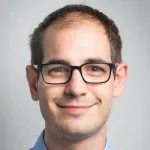
Theo Roth, MD PhD, was born in St. Louis, Missouri and grew up in Birmingham, Alabama before completing his undergraduate degree in Biology with Honors at Stanford University, along with a coterminal Master's degree in Biomedical Informatics. He completed his MD/PhD training in the Medical Scientist Training Program at the University of California, San Francisco. During his PhD work at UCSF with Dr. Alex Marson, he developed non-viral genome targeting, a new efficient method for large scale genetic engineering of diverse primary human immune cell types without the need for complex viral vectors. He further developed pooled knock-in screening, enabling rapid discovery of synthetic sequences to re-wire immune cell genomes and associate synthetic genotypes with high dimensional single cell phenotypes. Pooled screening of TCR and CAR T cell therapies has highlighted synthetic genetic perturbations with improved context dependent fitness profiles matched to specific solid tumor settings. After concluding his PhD, Theo co-founded ArsenalBio, and served as Arsenal’s founding Chief Scientific Officer for a year before returning to UCSF to complete his MD and Stanford to complete his residency in Pathology. He is currently an Assistant Professor in Pathology at Stanford University, an Innovation Investigator at the Arc Institute, and a Senior Fellow at the Parker Institute for Cancer Immunotherapy.
The Roth Lab develops, applies, and translates scalable genetic manipulation technologies in primary human cells and complex in vivo tissue environments. Working with students, trainees, and staff with backgrounds across bioengineering, genetics, immunology, oncology, and pathology, the lab has developed CRISPR-All, a unified genetic perturbation language able to arbitrarily and combinatorially examine genetic perturbations across perturbation type and scale in primary human cells. Ongoing applications of CRISPR-All in the lab have revealed surprising capacities to synthetically engineer human cells beyond evolved cellular states. These new capacities to perturb human cell’s genetics beyond their evolved functionality drives ongoing work to understand the biology and therapeutic potential of synthetic cell state engineering - in essence learning how to build new human genes tailor made for a specific cell and specific environment to drive previously inaccessible therapeutic cellular functions.
